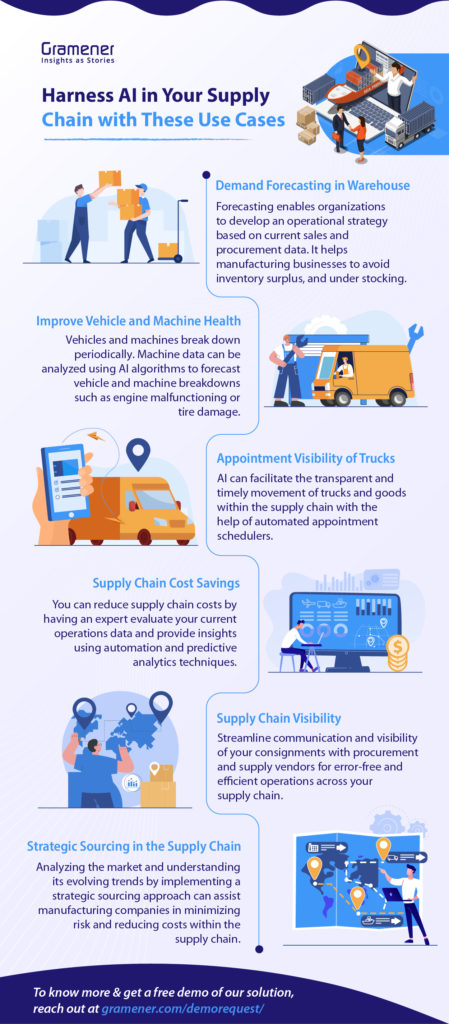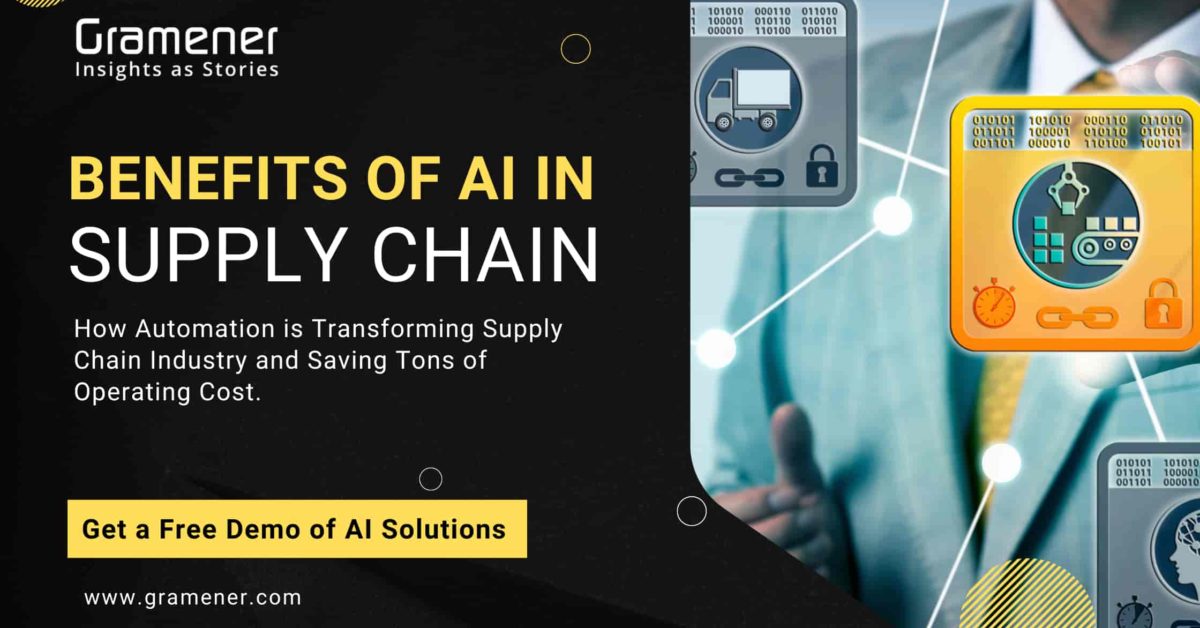Are you considering implementing Artificial Intelligence (AI) in your supply chain? If so, you are not alone. According to research, 37% of businesses, including supply chain companies, are already reaping the benefits of AI solutions. AI is also likely to contribute 15.7 trillion to the global economy by 2030. The future of AI in supply chain looks promising and has numerous benefits.
When you consider the above statistics, it’s easy to get motivated and implement this technology. It is more so when you understand what AI can do to improve your supply chain operations. This article explores the benefits of AI in supply chain, use cases of AI in supply chain and its business potential.
Table of Contents
Top Benefits of AI in Supply Chain Management
Reduced Operating Costs
AI solutions in the supply chain help decrease operating costs by reducing the amount of human labor. In a manual supply chain, people sort through thousands of products, check their quality, and ensure that those products get stored correctly.
Thus, it can be time-consuming and effort intensive. The benefits of AI in supply chain lie in ensuring that the same job can be done more efficiently by a computer program while providing data transparency and security for a better supply chain visibility.
Improved Customer Service Through Chatbots
One of the benefits of AI in supply chain management is chatbots. Chatbots can answer questions or take orders from customers and provide notifications of new products and upcoming events.
It is helpful for companies with large online presence, such as Amazon and Walmart. Chatbots help businesses save up to 30% of customer support costs.
Improved Productivity
AI improves productivity by automating manual tasks. For example, your workers may have to search for information or make decisions based on specific criteria, like whether an item is available.
AI-based solutions can also analyze large amounts of data and identify patterns. For example, they can locate items on your inventory list that no one has ordered recently.
Reduced Risks
Machine learning and natural language processing give real-time data about the location of inventory. AI helps you study your existing warehouse management system and identify weaknesses and gaps. However, an intelligent system will suggest relevant safety measures based on the findings. It can also identify potential risks to worker safety and create a safe environment.
Shortened Delivery Time
Businesses are continuously trying to find ways to reduce shipping times. Moreover, they want to make their products accessible to customers faster. One prudent way to do this is by using AI in supply chain management.
The benefits of AI in supply chain allow you to track shipments and pinpoint where delays occur. You can address them before they become problems.
Improved Warehouse Safety
AI solutions lead to better warehouse safety as they help organize the warehouse better and improve safety protocols. The benefits of AI in supply chain also include giving warehouse workers a way to manage their work. Improved safety practices lead to a better working environment.
Increased Warehouse Space Efficiency
When you implement AI-based supply chains, you can use your warehouse more efficiently. For example, if you use AI-based computer vision applications to manage your inventory, you can plan and order stock for the warehouse at the right frequency.
AI supports warehouse operations in a way that there will be an optimal quantity of stock at the warehouse, resulting in space optimization. You can save money on rent and other expenses related to storage. The impact of AI on supply chains is thus immense.
Accurate Inventory Management
Accurate inventory management is a crucial aspect of business. It ensures that you can meet customer demand and keep your supply chain running smoothly. But it is not easy to know exactly how much inventory you need, especially when supply chains and product lines are complex.
The benefits of AI in supply chain help you to better predict the future demand based on current trends and past data. It is a critical step toward reducing waste and improving efficiency.
Reduced Waste in the Transportation Network
AI can help improve your supply chain by finding the most efficient and cost-effective way to transport goods. It can do this by analyzing data about how many trucks you need, the fuel consumed, and how long it takes to get from point A to B. This information determines the best route for transporting goods, reducing costs, and improving efficiency. It is thus one of the vital benefits of AI in supply chain.
On-Time Delivery
AI facilitates on-time delivery of goods by providing real-time information to supply chain managers. The AI system can analyze vast amounts of data and identify patterns, thus helping managers make better decisions.
For example, if there is a demand for a product at a particular location, an intelligent system can help plan for it in advance. The benefits of AI in supply chain include on-time delivery of goods and reduced costs associated with the storage of excess inventory.
How is AI Changing the Future of Supply Chain?
What is the future of AI in supply chain? Supply chain management is an essential function of many businesses. Furthermore, supply chains are incredibly complex, especially considering the different suppliers, goods, and services involved in getting products to consumers. Because of this complexity, it can be challenging to get all aspects of the supply chain to operate efficiently.
This is where automation, the future of AI in supply chain, comes in. A digital supply chain is a more advanced form of a company’s supply chain. It allows you to simplify your supply chains by reducing human error and increasing efficiency. Using automated systems for inventory management and shipping logistics can reduce costs and make your processes more transparent.
Here are some more benefits of AI in supply chain and the areas where they help in reducing operational costs:
- Safety: AI-based systems assess the likelihood of an accident occurring on a given day or time. This allows you to take preventive measures.
- Asset Maintenance: AI systems analyze vast amounts of data to identify patterns that humans would miss. This allows them to predict when an asset will fail, which helps prevent costly downtime.
- Supply Line Predictions: The use of AI in the supply chain helps with supply line predictions by helping you forecast demand, plan for variation, and forecast capacity usage.
- Energy Efficiency: AI in supply chain uses machine learning to help with energy efficiency by identifying inefficient transportation routes and suggesting better ones.
- Freight Management: AI helps with freight management by ensuring that you remain aware of ongoing shipments and their status. It thus enables better planning.
AI Impact on Supply Chain Management
Supply chain management has become much more critical in today’s competitive environment. The supply chain market will likely grow at a CAGR of 11.2% between 2020 and 2027, and AI will undoubtedly play an important role in this success story.
If, as an example, you have a retail business, you need to ensure your shelves remain stocked with products that match customer demand. Similarly, if you are a manufacturer, you need to respond quickly to any changes in consumer behavior.
You need to streamline your processes, increase efficiency, reduce costs, and improve quality to achieve these goals. Therefore, you can do these by using AI solutions that enable you to analyze data in real-time and make predictions based on historical data.
The benefits of AI in supply chain will help you improve performance levels across supply chain optimization, inventory management, etc.
AI And Analytics-driven Use Cases to Control Supply Chain Disruptions
Here are various use cases that show how the benefits of AI in supply chain help control disruptions.
Demand Forecasting in Warehouse
There are copious benefits of AI in supply chain. For instance, it can help with demand forecasting in warehouse supply. Real-time data analysis helps you predict future demands and avoid stock outs. If you are a retailer, the need for your product might vary depending on the weather or time of year. With AI, you can predict how much demand will change and prepare accordingly.
Improve Vehicle Health
AI systems help improve vehicle health by leveraging the data from sensors. AI algorithms can analyze the data to determine issues with the vehicle, such as engine trouble or tire damage. The intelligent system can then alert the driver or fleet manager of potential problems before they happen.
Loading and Unloading Visibility
AI offers transparency into the supply chain processes, including loading and unloading. However, with data at your fingertips, you will be able to make better decisions to optimize your operations. It will help reduce costs and improve customer satisfaction.
Supply Chain Cost Savings
AI helps with predictive analytics and automation. Both can help make informed decisions related to operations, leading to cost savings. It ultimately results in a decrease in operational costs, such as labor expenses associated with manual processes.
Supply Chain Visibility
Besides visibility, you can improve supply chain management with AI, making it easier to control the entire process. The benefits of AI in supply chain are clear. Improved visibility means better collaboration between suppliers and customers, more efficient operations that result in fewer errors, and better products for consumers.
Strategic Sourcing in the Supply Chain
The benefits of AI in supply chain help with strategic sourcing by identifying critical suppliers and partners. Using data science techniques to analyze sales data, AI can quickly identify suppliers that are most likely to fail or become unreliable. However, this allows you to improve supply chain management with AI.

What are Some of the Challenges of AI in Supply Chain?
There are several benefits of AI in supply chain. However, a few challenges exist. Let’s look at them.
- Large Initial Investment: The initial investment for the implementation of AI in the supply chain can be high. It also takes time and effort to implement it properly to get the desired results.
- Factors of Scalability: To make an AI-based system scalable, you need to add new data sources and prepare the model. However, it can be difficult if there are only a few data sources or if you do not have enough time to train your model.
- Training Costs: You need to custom train AI in your business and industry to get the desired outcome. This requires time and money, which could be a constraint at times.
- Operating Costs: AI affects operating budgets through the cost of developing and maintaining the AI software. Therefore, this includes the cost of hiring programmers and data scientists and fees paid to vendors who create and maintain the AI software.
Bottomline
The biggest advantage of AI in supply chain & logistics is that it can make decisions for you. Moreover, it can provide more accurate estimations and help you eliminate unnecessary spending. In the end, AI also benefits you by reducing operational costs and increasing profits. The benefits of AI in the supply chain are thus plenty, and there cannot be a better time for your business to leverage them.
Gramener is a leading provider of AI-based solutions for businesses dealing with large and complex supply chains. Talk to one of our experts today to understand how well our solutions will help you overcome your challenges.
Contact us for custom built low code data and AI solutions for your business challenges and check out supply chain AI solutions built for our clients, including Fortune 500 companies. Book a free demo right now.


